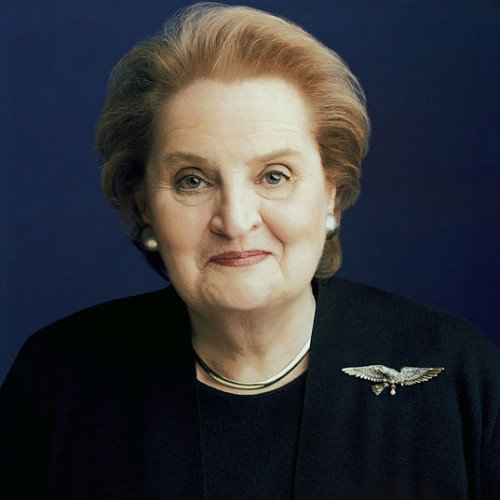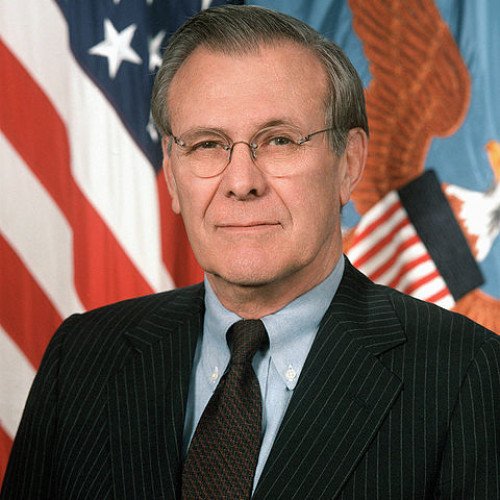Madeleine Albright VS Donald Rumsfeld

Madeleine Albright
Madeleine Jana Korbel Albright (born Marie Jana Korbelová; May 15, 1937) is an American politician and diplomat who served as the first female United States Secretary of State in U.S. history from 1997 to 2001 under President Bill Clinton.Along with her family, Albright immigrated to the United States in 1948 from Czechoslovakia. Her father, diplomat Josef Korbel, settled the family in Denver, Colorado, and she became a U.S. citizen in 1957. Albright graduated from Wellesley College in 1959 and earned a PhD from Columbia University in 1975, writing her thesis on the Prague Spring. She worked as an aide to Senator Edmund Muskie before taking a position under Zbigniew Brzezinski on the National Security Council. She served in that position until 1981, when President Jimmy Carter left office.After leaving the National Security Council, Albright joined the academic faculty of Georgetown University and advised Democratic candidates regarding foreign policy. After Clinton's victory in the 1992 presidential election, Albright helped assemble his National Security Council. In 1993, Clinton appointed her to the position of U.S. Ambassador to the United Nations. She held that position until 1997, when she succeeded Warren Christopher as Secretary of State. Albright served in that capacity until Clinton left office in 2001. Albright has served as chair of the Albright Stonebridge Group since 2009. She is the Michael and Virginia Mortara Endowed Distinguished Professor in the Practice of Diplomacy at Georgetown University's School of Foreign Service. In May 2012, she was awarded the Presidential Medal of Freedom by U.S. President Barack Obama. Secretary Albright also serves on the board of the Council on Foreign Relations.
Statistics for this Xoptio

Donald Rumsfeld
Donald Henry Rumsfeld (born July 9, 1932) is a retired American politician. Rumsfeld served as Secretary of Defense from 1975 to 1977 under Gerald Ford, and again from January 2001 to December 2006 under George W. Bush. He is both the youngest and the second-oldest person to have served as Secretary of Defense. Additionally, Rumsfeld was a three-term U.S. Congressman from Illinois (1963–69), director of the Office of Economic Opportunity (1969–70), counsellor to the president (1969–73), the United States Permanent Representative to NATO (1973–74), and White House Chief of Staff (1974–75). Between his terms as Secretary of Defense, he served as the CEO and chairman of several companies. Born in Illinois, Rumsfeld attended Princeton University, graduating in 1954 with a degree in political science. After serving in the Navy for three years, he mounted a campaign for Congress in Illinois's 13th Congressional District, winning in 1962 at the age of 30. While in Congress, he was a leading co-sponsor of the Freedom of Information Act. Rumsfeld reluctantly accepted an appointment by President Richard Nixon to head the Office of Economic Opportunity in 1969; appointed counsellor by Nixon and entitled to Cabinet-level status, he would also head up the Economic Stabilization Program before being appointed ambassador to NATO. Called back to Washington in August 1974, Rumsfeld was appointed chief of staff by President Ford. Rumsfeld recruited a young one-time staffer of his, Dick Cheney, to succeed him when Ford nominated him to be Secretary of Defense in 1975. When Ford lost the 1976 election, Rumsfeld returned to private business and financial life, and was named president and CEO of the pharmaceutical corporation G. D. Searle & Company. He was later named CEO of General Instrument from 1990 to 1993 and chairman of Gilead Sciences from 1997 to 2001. Rumsfeld was appointed Secretary of Defense for a second time in January 2001 by President George W. Bush. As Secretary of Defense, Rumsfeld played a central role in the invasion of Afghanistan and invasion of Iraq. Before and during the Iraq War, he claimed that Iraq had an active weapons of mass destruction program; yet no stockpiles were ever found. A Pentagon Inspector General report found that Rumsfeld's top policy aide "developed, produced, and then disseminated alternative intelligence assessments on the Iraq and al Qaida relationship, which included some conclusions that were inconsistent with the consensus of the Intelligence Community, to senior decision-makers". Rumsfeld's tenure was controversial for its use of torture and the Abu Ghraib torture and prisoner abuse scandal. Rumsfeld gradually lost political support and he resigned in late 2006. In his retirement years, he published an autobiography Known and Unknown: A Memoir as well as Rumsfeld's Rules: Leadership Lessons in Business, Politics, War, and Life.